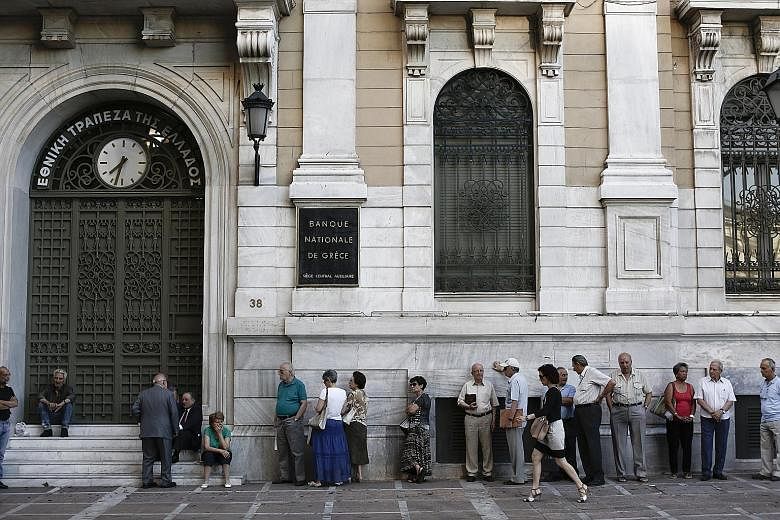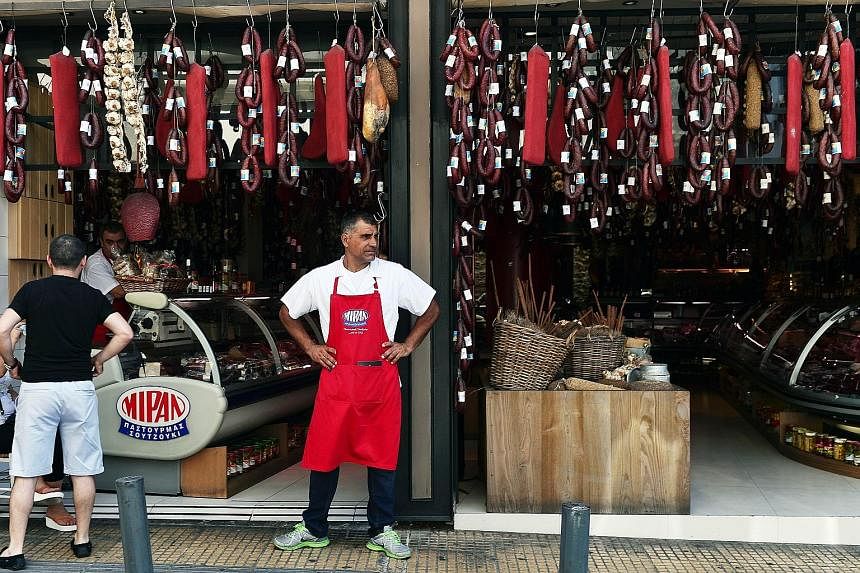ATHENS • Greeks queued outside banks yesterday as they reopened three weeks after closing to stop the system collapsing, the first cautious sign of a return to normal after a deal to start talks on a new package of bailout reforms.
However, limits on withdrawals remain and payments and wire transfers abroad are still not possible - a situation which German Chancellor Angela Merkel said on Sunday was "not a normal life" and warranted swift negotiations on a new bailout, expected to be worth up to €86 billion (S$128 billion).
The stock market will also remain closed until further notice. Increases in value-added tax (VAT)agreed under the bailout terms have taken effect, with VAT on food and public transport jumping to 23 per cent from 13 per cent.
The bank closures were the most visible sign of the crisis that took Greece to the brink of falling out of the euro earlier this month, potentially undermining the foundations of the single European currency.
Their reopening followed Prime Minister Alexis Tsipras' acceptance of a tough package of bailout demands from European partners but a party revolt has threatened the stability of his government and officials say new elections may be held as early as September or October.
Queues formed outside banks in Athens as long-suffering Greeks waited to take care of business frozen during the past three weeks.
"Things are better than the last few weeks. Thank God we didn't end up with the drachma!" said pensioner Maria Papadopoulou, 62. "I came to pay bills and my taxes. Last week I couldn't and all of this is very tiring for older people like me."
Cash withdrawals are a bit more flexible, with a weekly limit of €420 instead of the daily €60 previously.
"Capital controls and restrictions on withdrawals will remain in place but we are entering a new stage which we all hope will be one of normality," said Ms Louka Katseli, head of the Greek bank association.
Greeks will be able to deposit cheques but not cash, pay bills as well as have access to safety deposit boxes and withdraw money without an ATM card. Bankers said there may be some minor disruptions, but they expected services to resume largely as normal.
"I don't expect major problems, our network and the network of our competitors are ready to serve our clients," said a senior official at Piraeus Bank, one of the big four lenders."There might be lines because many people will want to withdraw money from their deposit boxes."
Meanwhile, a source close to the finance ministry confirmed that the government has started paying €4.2 billion to the European Central Bank and outstanding sums owed to the International Monetary Fund, made possible by a short-term loan of €7.16 billion granted by the EU last Friday.
Mr Tsipras is eyeing a fresh start and swift talks on the bailout aimed at keeping Greece afloat but he still faces hurdles, with parts of the ruling Syriza party in revolt over the terms of the bailout agreement.
The Greek Parliament approved the bailout package last Thursday but the Prime Minister was forced to rely on votes from the opposition after 39 rebels from his Syriza party voted against or abstained.
A second vote will be held tomorrow, on measures including justice and banking reforms, when a similar outcome is expected. Pro-government newspaper Avgi has said the vote would be a "crash test" that could even result in the Prime Minister's resignation.
The bailout terms include tax hikes, pension cuts, strict curbs on public spending, an overhaul of collective bargaining rules and a transfer of €50 billion of state assets into a special privatisation fund.
REUTERS, AGENCE FRANCE-PRESSE
- SEE EDITORIAL


